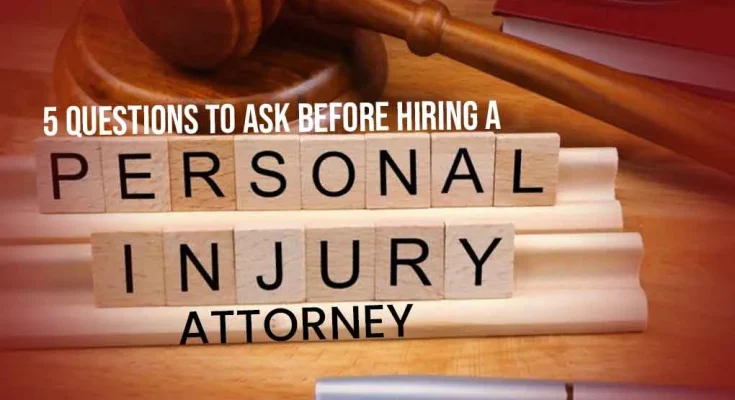Questions to Ask Before Hiring a Personal Injury Lawyer, Choosing the right personal injury lawyer is a critical step in securing the best possible outcome for your case. Whether you’re dealing with a car accident, workplace injury, or medical malpractice claim, ensuring you have the right legal representation can make all the difference. Before making your decision, ask these essential questions to evaluate potential lawyers and ensure they align with your needs.
1. What Experience Do You Have in Personal Injury Cases?
Experience is crucial in personal injury law, as each case requires a unique approach. When asking about experience, focus on: Questions to Ask Before Hiring a Personal Injury Lawyer.
- Years of Practice: How long have they been handling personal injury cases?
- Case Types: Do they have specific experience with cases similar to yours (e.g., motor vehicle accidents, slip and falls)?
- Success Rate: What percentage of their cases result in favorable settlements or verdicts?
An attorney with extensive experience will be better equipped to handle the complexities of your case.
2. What Is Your Track Record of Success?
Understanding the lawyer’s past performance can give you confidence in their ability to handle your case. Ask about: Questions to Ask Before Hiring a Personal Injury Lawyer.
- Notable Settlements or Verdicts: Can they share examples of substantial outcomes they’ve achieved?
- Trial Experience: How often do they take cases to trial, and what is their success rate in court?
A strong track record demonstrates the lawyer’s capability to secure maximum compensation, whether through settlement or litigation.
3. Who Will Be Handling My Case?
In some law firms, the attorney you initially meet may not be the one handling your case. Clarify:
- Primary Contact: Will they personally oversee your case, or will it be delegated to junior attorneys or paralegals?
- Team Involvement: If others are involved, what roles will they play?
You want to ensure that an experienced professional is actively managing your case.
4. What Is Your Fee Structure?
Understanding how legal fees work is essential to avoid surprises later. Key questions include:
- Contingency Fee Basis: Do they only get paid if you win? What percentage will they take from the settlement or award?
- Additional Costs: Are there any upfront fees, court costs, or administrative expenses?
- Payment Transparency: Will they provide a written agreement outlining all fees?
A clear explanation of the fee structure ensures you know exactly what to expect.
5. How Will You Communicate With Me During the Case?
Effective communication is vital during the legal process. Ask about:
- Frequency: How often will they provide updates on your case?
- Preferred Methods: Do they communicate via phone, email, or in-person meetings?
- Availability: Will they be accessible for urgent questions or concerns?
A responsive lawyer can ease your stress and keep you informed throughout your case.
6. What Is the Estimated Timeline for Resolving My Case?
While no lawyer can guarantee an exact timeline, they should provide a general idea based on similar cases. Ask:
- Factors Affecting Duration: What could cause delays in your case?
- Settlement Timeline: How long do most negotiations take before reaching a resolution?
- Trial Length: If the case goes to court, what is the expected timeline?
A realistic timeline helps you set expectations and plan accordingly.
7. What Resources Do You Have to Build My Case?
Successful personal injury cases often require resources such as expert witnesses and detailed investigations. Inquire about:
- Access to Experts: Do they work with medical professionals, accident reconstruction specialists, or economists?
- Investigation Team: How will they gather evidence, such as police reports, witness statements, and medical records?
- Technology: Do they use advanced tools for case preparation and presentation?
A well-equipped lawyer is better positioned to build a compelling case.
8. What Challenges Do You Foresee in My Case?
Every case has potential hurdles. A skilled lawyer will be upfront about:
- Possible Obstacles: Are there issues with liability, evidence, or insurance negotiations?
- Strategies to Overcome Challenges: How will they address these concerns?
Their ability to anticipate and plan for challenges demonstrates their expertise and dedication.
9. Have You Handled Cases Against Similar Defendants or Insurance Companies?
Insurance companies often have aggressive legal teams. Ask if the lawyer has:
- Experience With Insurers: Have they dealt with the specific company involved in your case?
- Strategies for Negotiation: How do they handle pushback or lowball offers?
- Litigation Readiness: Are they prepared to go to trial if the insurer refuses to settle fairly?
An attorney familiar with opposing parties is better equipped to advocate for you.
10. What Is the Likely Outcome of My Case?While no lawyer can promise specific results, an experienced attorney can offer a realistic assessment. Ask:
- Case Value Estimate: Based on past cases, what compensation might you expect?
- Settlement vs. Trial Likelihood: What are the chances of settling out of court versus going to trial?
- Factors Impacting Outcome: What could strengthen or weaken your case?
A transparent lawyer will give you an honest evaluation rather than making unrealistic promises.
11. Can You Provide References or Client Testimonials?
Hearing from past clients can give you insight into the lawyer’s professionalism and effectiveness. Request:
- References: Are there former clients willing to share their experiences?
- Online Reviews: What do online testimonials reveal about their reputation?
- Case Examples: Can they share anonymized examples of similar cases?
Positive feedback from previous clients is a strong indicator of quality representation.
Conclusion
Hiring the right personal injury lawyer requires careful consideration and thorough vetting. By asking these critical questions, you can identify a legal professional who has the experience, resources, and commitment to achieve the best possible outcome for your case.




